Paul T. Morris' High School Autobiography
To The Honor Of
SAINT LA SALLE
On The Three Hundredth Anniversary of His Birth
TABLE OF CONTEXTS
Chapter I
The Predecessors
Chapter II
The Grand Entrance
Chapter III
Early Days
Chapter IV
"Reading, Riting, Rithmetic"
Chapter V
The Little Explorer
Chapter VI
The Fortune TellerChapter I
On a cold clear morning in 1732, over two centuries ago, there was born a child who was to be molded into a great man. His fame was to be spread materially, in texts, immaterially in the changes he made in our mode of life which was to follow. This brisk morning was one which belonged to the month of February. To be more specific, it was the twenty-second day of February in 1732. Yes, the strong infant that lay in the ornately carved crib was soon to be named George. A common name for such an uncommon man. But it only proves again that a name does not make a man. On this same morning in February, at the same time (10:00 A.M.) exactly two hundred years later many more children were born. I am one of them. The conditions surrounding Washington two hundred years ago were revolutionary in comparison to the circumstances of my birth. Another fact to remember is the great fortune attached to that hour and day of the month and year of the century. How many of these babies born in 1932 would achieve the honor and high standing that their famous forefather reached through hard labor and sacrifice? What obstacles must they overcome that George did not have to vanquish In the eighteenth century? What difficulties did George have that I do not have? Am I overcoming these difficulties as well as the Great Statesman did his? Likewise, what advantages has this modern period gained through man's two hundred years of broad experience? All these questions I will try to answer through a broad analogy between George's life and my own. Does this analogy end on our birthday likeness or does it continue on throughout our lives? This comparison of the twentieth century to the eighteenth will be accomplished my means of my autobiography.
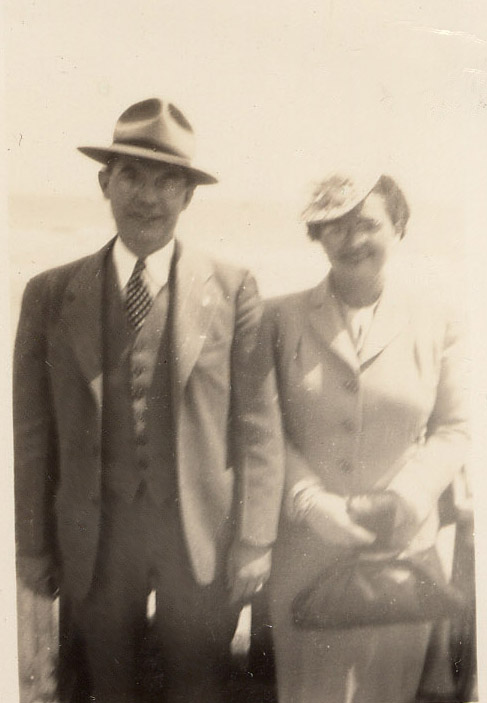
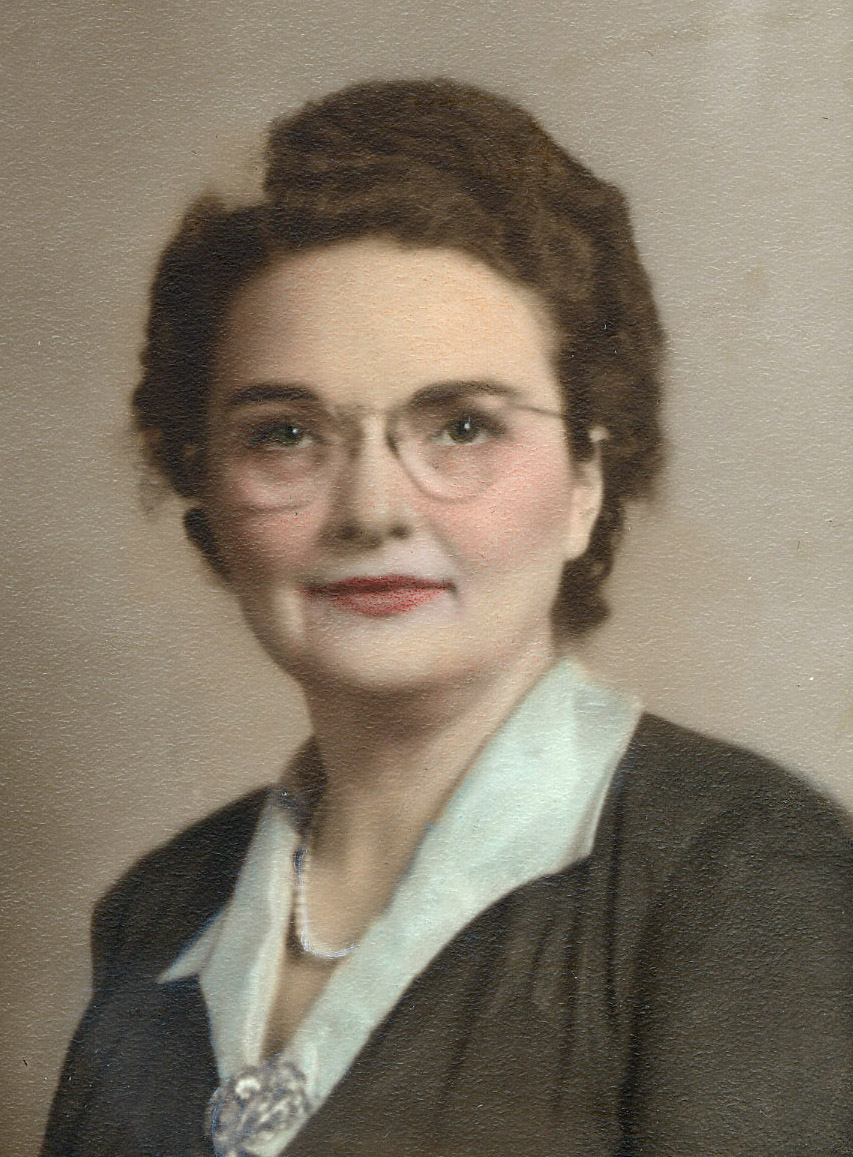
HE WAS A "DOWN EASTER" SHE WAS AN "UP-STATER"
My parents came from varying states but both, by fate converged on Philadelphia at an early age as their place of residence. My father, being
a *Down Easter" from Connecticut had a life different than that which my mother was accustomed in her home town. The thriving community to which she owes her allegiance is a small, small coal town In Pennsylvania called Shenandoah. That name to me has always sounded awkward as a child, but upon seeing the town this was readily understandable. Honestly and truthfully I prefer the town of Bridgeport to that coal town, mainly for reasons quite evident to visitors of either town John Thomas Morris, my Dad, was the second son of four sons. His home life consisted of an Irish cop for a father, incidentally who was a great guy, and a colleen for a mother. My mother's home life was somewhat similar, with her father coming from “the auld sod." He was a pump man in the mines. John L. Lewis ran the pump next to his he keeps insisting today. When we doubt him with a fanciful laugh he comes back with "Well the guy had bushy brows just like John L."
Be that as it may, I must continue. You might ask how I came by all this information, since no one had ever even considered having me as their child yet. Well, I pieced a few facts together made a few conclusions and up came a lucid picture of my ancestry. my mother liked her home, it was not as "desire satisfying" as my father's but their was an ancient custom, still quite prevalent in the coal territory that the children get out and
Work. My mother, being extremely ambitious (how do you think she got my father), came to Philly and found an extremely lucrative position for such a young woman. Each week she found in her bulging pay envelope the astounding sum of eight dollars. This, of course, was the result of a course business college, which she took at night, however, promotions and my mother were on friendly terms and till this day she boasts of working as the boss's secretary and counting every piece of brick and tile that went into the Broad Street Subway, (on paper that is). With this position we are drawing closer and closer to my grand entrance. The curtains are not open but merely the stage hands have their hands on the controlling rope. Before Paul Thomas can make his entrance, we must discuss John Thomas, as was previously mentioned Dad came from Bridgeport, Connecticut, a city of many industries and machine shops. These accounted for the mechanical knowledge "Jack" as he is called by friends, acquired during his youth. His career of jobs started easily and was quite diversified at first. The main influence of these jobs on his life was experience. Soon, however, the First World War perturbed everyone and dad went to enlist. He boasts today of not being a slacker and pitching in on a job and it must be well done. In fact, his pet dislike in a personal way is a slacker. His army career was successful as he rose to the rank of sergeant and served efficiently in France. Some of the experiences he relates today about the army life in France are quite entertaining and we leave the judgment of Veracity up to the individual listener. Upon our victory and his return to a position of salesman in the automotive field, which was still a mere infant at that time, we find a period of advancement, Dad told me of his unlimited expense accounts and his old autos and I listened enviously trying to picture in my mind the car of twenty-five years ago. Thank heaven I was never able to quite picture it successfully or my car riding career might have been inhibited with strong doubts as to its safety. Thus, we have my mother working as a secretary and my father as a salesman. Incidentally, my mother's duties included those of receptionist also. Can you guess the circumstances of their meeting? Yes, that's right. Pop went in the office to seek the boss and didn't seek far enough. He was lucky, however, he found my mother. This meeting lead to a courtship and of course marriage.
How did George's ancestry compare with mine? It was somewhat noble on his father's side with his great grandfather being a rich settler of Virginia. His second son Lawrence receiver some of his estate and his son Augustine carried on the tradition of the family. Augustine was the father of the "Father of our Country." Augustine married twice having first four children and secondly six children. The eldest son of the marriage, which was with Mary Ball, was baptized George. Augustine died at the early age of forty-nine, leaving his wife Mary and five children besides George. As can readily be seen there are few analogous characteristics in our parental background leaving only our birth date and hour as the single likenesses established so far.
Chapter II
Miss Margaret Mary Breslin and Mr. John Thomas Morris were married in the Church of the Gesu, 17th and Stiles Streets, Philadelphia, on April 17th,
1923. It was an intimate wedding with close friends and relatives. Incidentally, my father did not follow the pattern set by Augustine Washington, for this was his first wedding and it was not to be repeated later. The Morris' settled down in a comfortable apartment in North Philadelphia, with only Mr. Morris working. The missus stayed home and cooked, which she could and still can do very ably. Dad's job called for a good bit of traveling which was a hardship on the newly-weds. They managed very well, however. So, well in fact within a few short years John Robert was on his way to make his grand entrance. This he did capably on the night of October 19th, 1929. This called for a larger apartment. It was found on Broad Street, the 1400 block, and liked by all, including little John Robert. At this point we find a great setback which happened to the majorjity of working people during that period----The Depression. Yes, Dad lost quite a bit of money in the failing of the banks, but it just meant more hard work. And that's the only way the difficulty was overcome.
The men are beginning to pull on the curtain for I am standing impatiently in back of it awaiting my grand entrance. Finally, in 1932,on February twenty-second, about 10:00 in the morning, I appeared. I think everyone was glad to see me, even the doctor, for he got a healthy fee for delivering a healthy baby. Yes, I kicked and cried, just like George did and infants shall until Cod says that there shall be nor more infants.
I don't know whether my birth had an influence on it or not, but that month we moved into a house on Hilton Street, in a section called Tioga. It was a rented house, that's one of those things they used to have in the good old days, on a beautiful row residential street. The address was 1232 West Hilton Street, and it wasn't a bad home at all, because my mother and dad made it a good home for us. There was always someone there, my grandmother or father, an aunt or an uncle or sometimes a cousin. This was the home I came too from the hospital. The hospital was Temple University, which was a diaper's throw from our new house.
The advantages of a hospital birth here in the twentieth century are almost truisms that need not be elucidated. I had the advantage of anesthetics to make the birth easier and improved techniques to accomplish the same. I was kept warm with improved heating systems. These are the advantages I had over George. However, am I more healthy that George was?
The cost to George's father was probably a lot less than the sum rendered to Doctor Smith by my father. Therefore, the only likeness in our birth occurs in the date and the hour and the fact that we both cried and kicked. George was born in Wakefield, Virginia in a small frame house. Even though the medical advantages I had made me no healthier an infant than George was, however, they would have paid off considerably in my birth had not been normal.
Chapter III
The years spent in our new home were happy ones for me since I was a worriless baby. The life was easy, breakfast in bed, lunch in bed, and dinner in bed. This eternal siesta, as I thought it would be, was in reality short lived. My mother soon had me up on my "footsies" and I pretended to stumble a bit as I didn't want to alarm her with my precociousness. It's not that walking came easy to me, but at the ripe age of eight months, I almost was picked to be the subject of the "Walking Man" contest. Yes, I talked very early and easily. In my first year, I got slightly weary of walking, so I took to a "Kiddy Car." Riding along my merry way through the house from the front to the back I came upon a very enjoyable practice. As any child is, I was fascinated for a short time by this new method of entertainment, but it was of a long enough duration to cause some serious consequences. One day, I was speeding through the house like "Barny" Oldfield until I came to my downfall. Someone had left the door leading to the cellar steps ajar and I, being a little explorer at such an early age, sought to find the contents of that deep dark cavity which swallowed those stairs. Yes, I explored and found something very astounding. I found that I, a mere one year old, could holier as loud as Baby Snooks. This, I was not too happy to ascertain. You see, I had ridden down the cellar steps in my little cart. I was probably the first one year old to learn a lesson about driving. Nevertheless, I was rushed to the original site of my activities. Temple Hospital and stitched in the head. Dad's old Buick was really pushing it on the way over because the engine was cold. He said that it was the first time he ever raced a cold engine.
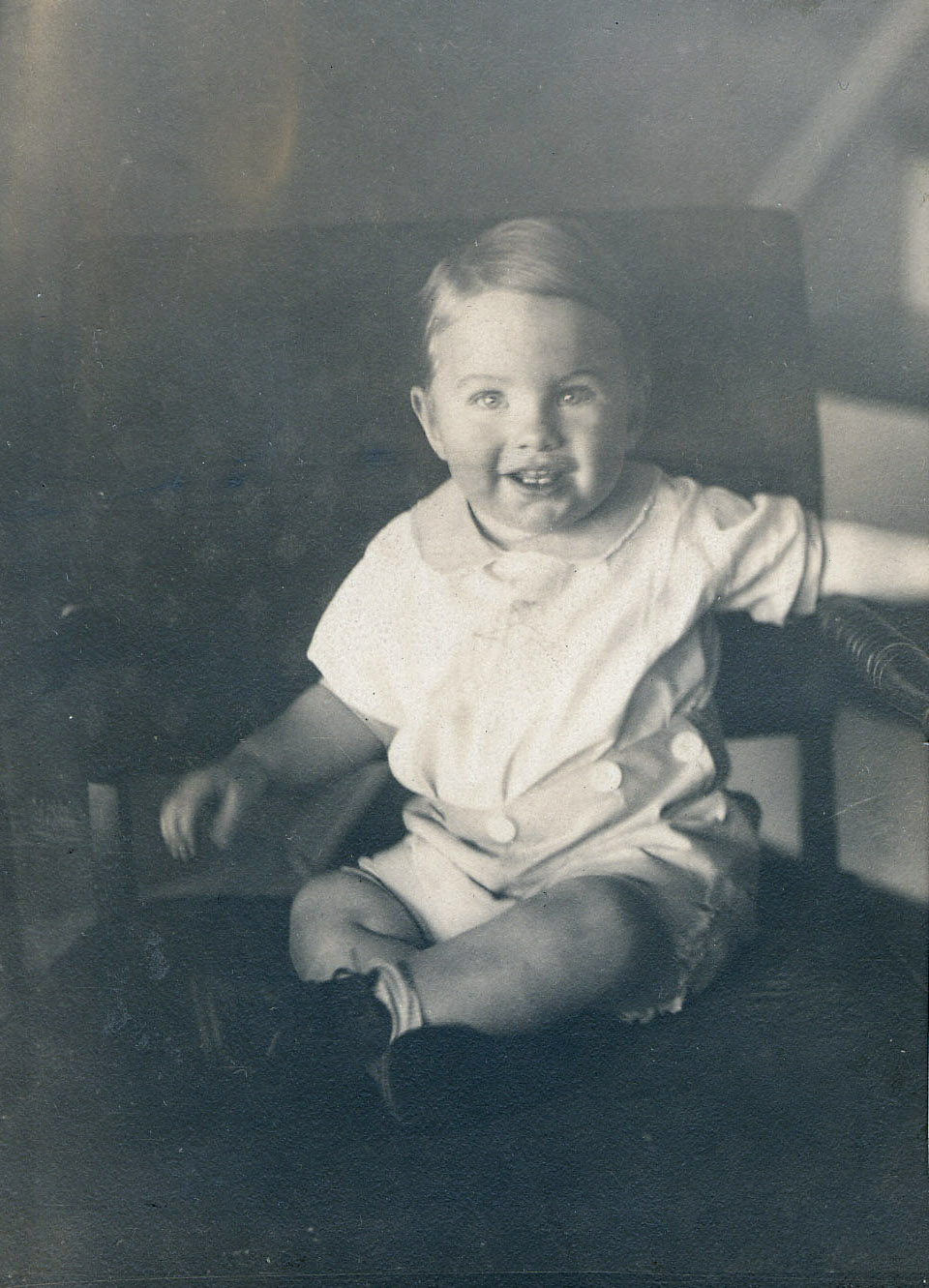
"IT WAS AN EASY LIFE"
Thanks, Pop!
That brings to my mind the question of what would George have done, had he split his head. Most probably, bleed to death or some sunken state. Also, what did George use as play toys? During that period there were few manufactured toys. They had to rely on some homespun object to provide a child’s entertainment. Perhaps, some homemade wooden top. Yes, it probably, proved to be as efficacious as any of 1933’s a modern toys. However,
1933's most certainly cost more than 1733’s.
During that same year, my mother's mom passed away and the entire family from Shenandoah, which was really a multitude of people, converged on our six room house at 1232 Hilton. I don't remember too much about this Irish wake or funeral but do remember much about succeeding funerals of the family members.
The years went by and I grew rapidly. I was a pudgy child especially around the legs and rather bright in my remarks. My memory for these is not too keen but one of my strong remembrances is the clothes I was forced to wear. Not by circumstances, but by what was "vogue" for babies of that period. I am sadly reminded of this constantly by a "cute", "adorable" picture which hangs upon my bedroom wall with the omniscient insistence of my Mom. In this picture of sweetness I'm leaning against some wooden objects, which we to this day are not able to distinguish, giving the impression that I was weak kneed or had some similar short-coming. I insist this is entirely false. In reference to that piece of furniture, I was dependent upon. It could be a radio, a chair, or a table. Someday, someone might remember.
When I was approximately three, there happened to me an experience which made me prejudged against "baby-sitters" for the rest of my life. A neighbor's daughter was left to act as my guardian for the afternoon. It was a beautiful afternoon in May and we, me and my "guardian", were out in the garden. Why she wasn't at school I don't know. In fact, I'll be glad to be an informer for the truant officer if he wishes to contact me. Anyway, we're out in the garden and I'm enjoying the sun and I think she was too. All of a sudden she remembers that babies are rocked in a cradle and she thought I might enjoy it. At the time, I would have turned handsprings for a chocolate ice cream cone but I was forced to settle for a rocking. There were no cradles nearby so my "guardian" decided to utilize the peaceful porch rockers, much to their's and my own discontent. I can remember looking down to the green grass as she picked me up to place me on the rocker. She then started to warble a few weak notes and rock me back and forth, mostly back. The few moments of ecstasy were short lived for I was soon back on terra firma, not right side up. It was another split head.
Another rush trip to the hospital and more stitches in the head. All because of a "baby-sitter." George didn't have these obstacles.
Chapter IV
Time was drawing nigh when I would be starting to attend kindergarten.
Oh, such anticipation. I thought it must be wonderful because the "goldy locks” cutie across the street was going to start too. If she did it, it must be fun. I had been playing all the childhood games with Dolores for as long as I could remember. All the neighbors claimed there was a romance a brewing. Could be! Anyway, it was a friendship that was to last for many many years. Even at such an early age, there were other admirers of Dolores. Yes, I guess there are some other connoisseurs in the neighbor. She was a typical little girl only more pretty. Her long blond curls were a perfect circle and seemed endless even though they merely extended to her shoulders. This likeness of blond curls may have been a basis for later preferences in "females of the opposite sex." Ralph was my competition for her attention not only at kindergarten age but for years to come. There was, what can truly be called friendly competition between us. This developed into just plain friendship that continued up until this day and will continue, for many years to come. Even upon being separated when Ralph was left down and I, the more fortunate was promoted we secured our comradeship. Seeing less of each other makes no difference for we go to different schools. You can recall there is now friend like a childhood friend. Kids are real people who haven't been inhibited with false notions, and their comradeship is real and mutual. It is difficult to express, but what I want to say is that a friendship between playmates can be broken only by severe means, if then.
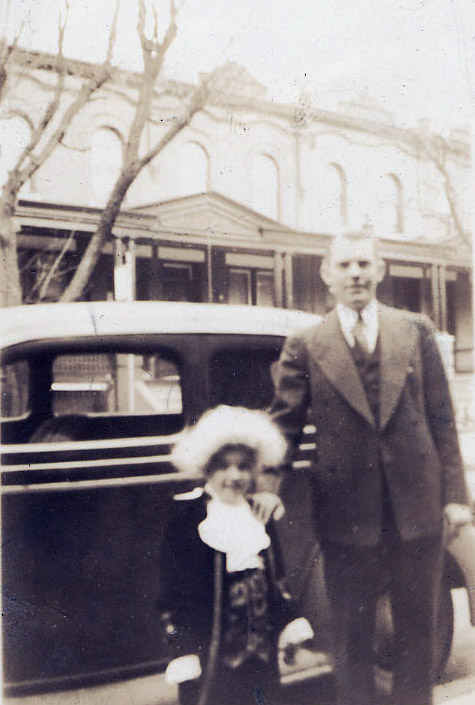
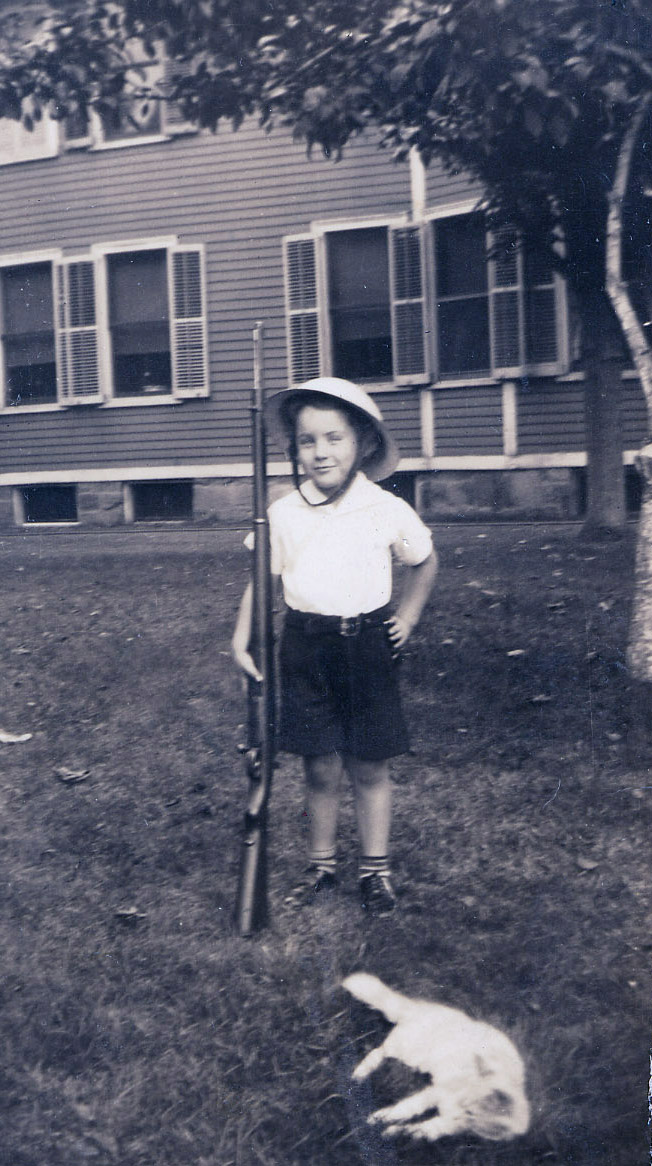
"REPLICA OF WASHINGTON ON HIS SIXTH BIRTHDAY" "ITS BIGGER TAN HE IS"
There were other friends but not so long lasting. They moved away early or entered a different sphere of activity.
However, many new friends were to be made in that strange new experience for me called school. I was five years old and not ready to be orientated to the ways of Mrs. Shallcross, who was really very mild upon second observations, but seemed ferocious upon my first viewing of her. So frightened was I when I let go of my mother's hand, that the tears immediately began to roll and I was overcome with body shaking culvers. How well I remember that the first day away from my "Mom" and my home was an ordeal for which I was not yet prepared. Upon being taken home, I was calmed a good deal and was persuaded to return to the new experiment tomorrow. This I did. It wasn't such a bad deal after all. We played games and ate and painted and we talked and listened to stories and even slept. This spoiled me. I wanted to continue this in later schooling but Brother Alfred keeps saying no. I'll never forget our quiet, calm and tranquil teacher. Till this day, she is still handling little brats like myself, and I often wonder, as I occasionally see her coming out of the school, whether she remembers me as one of her chargers. Of course, she answers my "Hello* but that is more or less, a habit with hardened school teachers. I've changed quite a bit since then they tell me, and it might be a trifle unfair to expect so much of a poor school teacher, Mrs. Shallcross was a wonderful person with a smile that almost says as much as my Mother's. It's also very kind. I remember the nature walks she would lead us on in the early spring. The trees of the neighborhood were not of a wide variety or beauty but she pointed out the wonders of them which today I cling too lovingly. It's a love of nature that is deep rooted because it was planted early. It's something that can never be taken away from me as can money or other pleasures.
The play periods were spent in block building by the boys of the class and it was a time looked forward to with much anticipation on my part. Ralph and I assumed an early lead over the rest of the class since we ruled the block building that went on. In fact many times Mrs. Shallcross would enforce our ultimatums made to stop interferences with our work. This was one action that till this day has me puzzled. Was our work, so exemplary that it should be left standing? Hum! I wonder. Maybe I should be a Mechanical Engineer. My father always said I know and understand mechanics easily but this was shown by a few mere fixit jobs. Anyway, I remember our teacher would leave our bridges stand over the weekend. Perhaps she even showed them to the other teachers. As I say, this early leadership that was exercised was a sign of something to follow. Both, Ralph and I were leaders for the remainder of our grammar school days. I was always in the center.
Another outstanding memory is the strong fear I contained of what was to come when I entered first grade. I wondered whether the work was hard. But I found it easy. This was true all the way through until the eighth grade. I began to wonder about high school and how difficult would it be. My fears were conquered though.
The early years of grammar school were interesting and fun. The fundamentals were taught me well by Miss Fisher, Miss Tongue, and Miss Smith, also Miss Nugent, who incidentally was a sister of Gerald Nugent who managed the Phillies for a short time. All these characters are vivid in my mind as they am impression on me as impressive persons. As I learned latter they all fitted very well the form of school teachers as it is usually depicted today. Miss Fisher was more or less the demon of the group and occasionally utilized a blackboard pointer for dual purposes. Never on me. I learned to read in her class and learned to read well. The stories are those still being read in today’s primers. "Dick runs, see Dick run" etc...
I wonder if Brother Gerald used the same primers' as a child. Hum! I wonder.
At this point we find Paul Thomas Morris in the second or third grade in public school. Incidentally, if you care to find any of the wonderful personalities I have mentioned, they are still at Simon Muhr School at 12th and Allegheny Avenue. You might ask about my religious education since I was in a public school. Well, this was accomplished in after school instruction classes at St. Stephens Parish School twice a week. Yes, it was time to make my First Holy Communion and the preparations were well under way. I studied my Catechism fervently and listened eagerly to the teachings of the Nun. Sister Mary Josephine. Finally came the day when Monsignor McNally, who passed away a few years ago, was to hear our catechism to as certain whether we were prepared for our first Communion. This interview was one of great awe. The crimson cape of the Monsignor fascinated me and his tall thin stature added to his stately, Godly, air. Monsignor McNally was very gentle and loved children. I had of remorse when I discovered he had a slight penchant for sweet little girls with long curls. At least he showed them a little extra attention. He was a wonderful man and spent much of his time with the children in the school. May
God bless his soul. However, I did pass the oral examination and made my Holy Communion, at the age of six with a great and beautiful ceremony. It was a Sunday morning the nine o'clock mass and it will be one mass I will never forget for eternity. It was a very edifying service with the white suits and dresses seeming to signify the true purity of the innocent children. Great care was taken to prevent any spots from being made, even though the short pants showed my tubby legs to their worst advantage. Many stories of what would happen if the Host were touched by the teeth forewarned me enough to exercise care in swallowing it. After the long sermon,
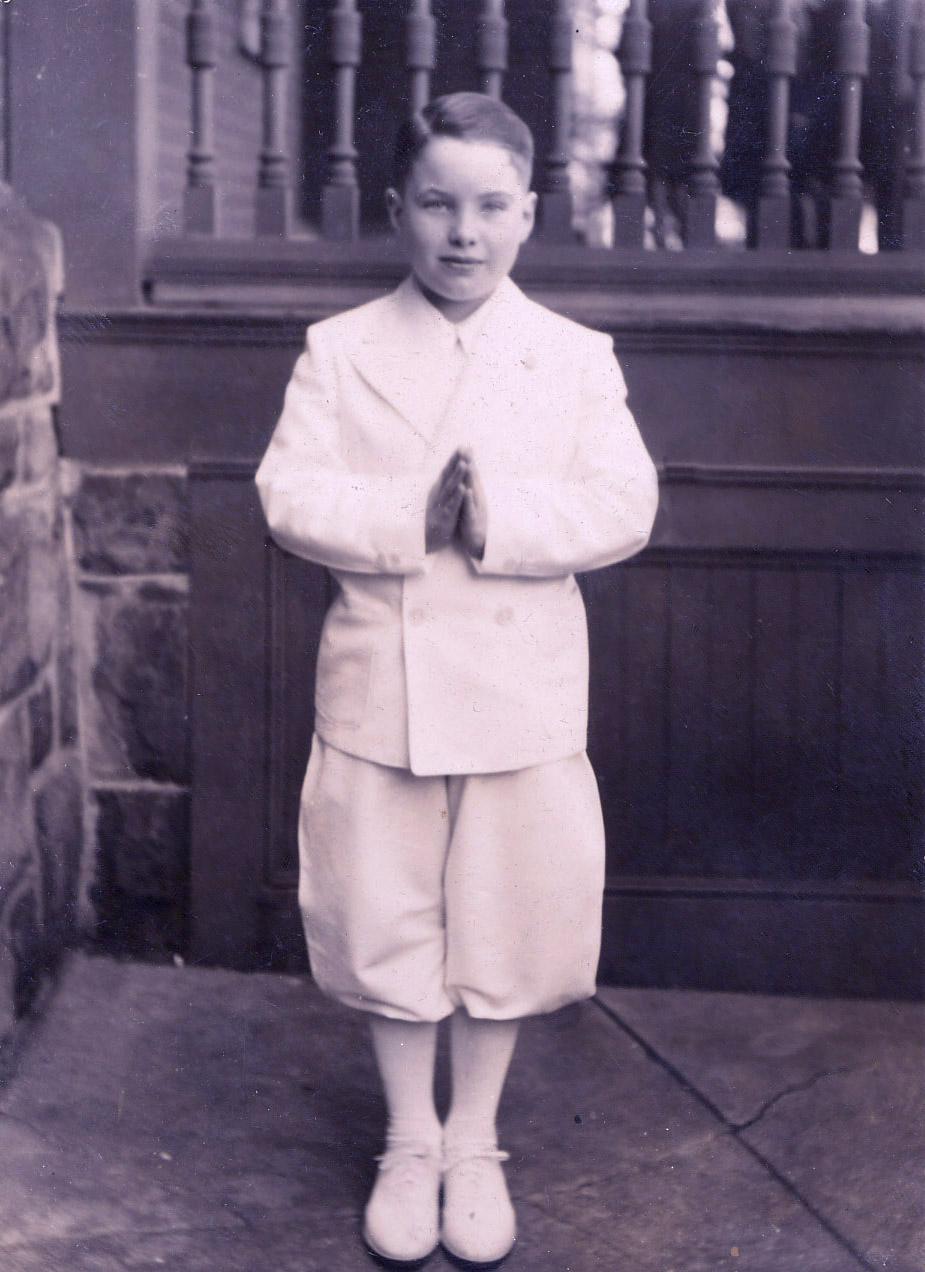
"INNOCENCE UNMATCHED"
which I forget, the recession led us out on the church grounds. Then back to the school yard and many pictures were taken. What a true holy pose instruck by the child who just received his First Communion. I wonder if it can be equaled on this earth. I doubt it very much. The pangs of hunger following the ceremony were really great ones but they were soon quieted, again, Mom took care of this.
Soon the summer came around and Dad had an almost nightly obligation of taking my brother and myself to the railroad station or to the cool breeze swept park in the car. On driving we were attracted by the soft green grass of the park and the next evening by the noisy dust of a "chugging" train. It was a glorious adventure. In fact, I am not afraid to admit that even today a large charge is gotten by me when a long heavy streamliner pulls into the station. I often wonder whether this is a natural impulse of every man or whether this remnant of childhood is peculiar to me. I never did completely lose that desire of every boy to become a train engineer. I wonder whether I am normal. Hope so.
The summer ended and I returned to the fourth grade. Time passed quickly and my teeth did the same. I now had them all, thanks to heaven and calcium. The beginning of school was a sad affair for several reasons.
It meant the return to nightly homework and the lack of freedom during the day which allowed endless play periods. Another strong disappointment was the stopping of the nightly nickel. Each summer evening after supper I was awarded a nickel to buy an ice cream cone, which was relished as the
Connoisseur relished a tasty steak for some ten to fifteen minutes. How easily I was pleased as a child. Today I must have a rich sundae. Nevertheless, with the coming of winter, ice cream cones every night were temporarily discontinued. Yes, a child can be pleaded very easily even though he dreams of wonderful things he cannot have. These dreams are of a short duration.
This winter brought with it the month of February and with it came my eighth birthday. It had been a practice that on each birthday, a party was given for me, and what a party it was. It was carried out in the theme of George Washington's Day. Hatchets filled with candy cherries and special napkins. This birthday was decided to be something special and my father, who always exhibits a flair for the theatrical mode, tried an elaborate costume for me from a downtown agency. It was complete to the final detail of a powdered wig and lace cuffs. Outwardly, it was a rather good imitation of the dress of George Washington. The party was a great success.
Also in this year, my Holy Confirmation was made as the climax of more Catechismal studying. In my memory, it was somewhat similar to the ceremony at Holy Communion time. I continued going to instructions twice a week and also the summer classes in the warm mornings of July. These were beneficial in religion but also entertaining as we did some handicraft usually a religious project in wood work or something similar. Soon the winter instructions were reduced to one day a week through necessity. My mother insisted that I should take music lesions, namely the piano. I countercharged that I couldn't be like other boys and take up the drums or trumpet or something more masculine. And mother said, "Yes", that's right you can't. There's nothing so beautiful as a piano. Well my mother was right, as usual, and I failed to realize this until a later age. My teacher, Miss Harris, could only take me on Tuesday afternoons, there by accounting for the one day absence from instructions. It seemed to me that every week brought with it a series of three or four Tuesdays. I found it hard to believe that there was only one Tuesday in a week. I really developed a dislike for the piano and practice, although, even then I enjoyed good music. That is another good taste that was planted early
to account for its being so inveterate. Later on, I didn't mind the piano but I didn't stick with it. I believe I could have done very well since I showed signs of quick comprehension.
With the passing of time, I was passing although not as quickly. I even was a victim of that much frowned upon practice of public schools known as "shipping." My life in the fifth and sixth grades was by comparison, rather uneventful, with the exception of several childhood diseases. These were overcome with some degree of ease and no remaining results are apparent. My career at Simon Muhr was soon drawing to a close, a matter of a year or two and my importance became greater. One incident I maintain to hold significance involved me and a large set of keys on a ring. The keys were a set for which none knew a purpose. They were useless, but I attached some importance to a person who carried a great number of keys. I thought other people would too, so, I attached the keys to me and unconsciously at the same moment, I attached an air of importance about myself. Yes, I made quite an impression on the younger pupils that afternoon with the keys jingling at my waist. I hope they didn't think I was the Janitor. For fear of this I abandoned the keys the next day. To me, this shows myself constantly trying to make impressions, a fault of which I'm still endeavoring to rid myself of. After all, half the battle is won when a personal fault is recognized by ones own self.
In my final year at Muhr, I achieved distinguished marks and made myself eligible for an award made to the outstanding pupil. I didn't realize how close I was. Officials said I would have gotten it if I didn't miss the last two months, because of illness. Oh well, it was only a bronze metal. My courses in this last year were very good. A lot of material was gotten from them. Miss Graham, whom I adored, speaking
figuratively, and whom liked me too, taught a good bit of English. Miss Logan really infiltrated our heads with a great deal of science and Miss Marley, who was quite a character, taught us social studies. These were merely the courses I liked. In this final year, we put on several plays and shows. In which I always found a good part. It was really a good soft enjoyable life.
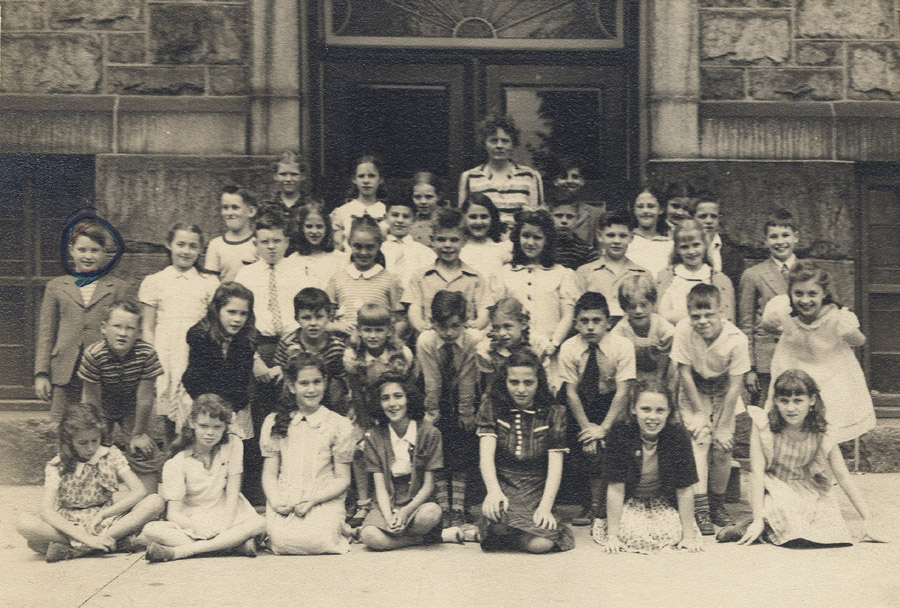
"WHAT A MOTLEY GROUP"
As was mentioned before, during the final part of the eighth grade, I contracted rheumatic fever. It is a disease of children from which I finally emerged, by means of the best of care, unscarred or harmed through the grace of God. Its beginning was noted with signs of nervousness and fatigue and severe rheumatic pains. It was pain as I never felt before and hope to never again. Luckily, it passed after several days and the doctor could only recommend a long period of rest. This period was not unbearable through the ceaseless efforts of my mother. By making my food attractive she kept up my appetite. This was a great help. Regular visits by friends also helped and the infection appeared to disappear around August. A trip to the shore was in order, as was our usual summer custom now, so we left for Ocean City and a cute little cottage. It must be that there I exerted myself and as a result in September in place of school, I returned to the hospital. Solid rest and quiet were the strict orders. The only visitor permitted was my mother. It was slightly rough. This rest and an insuring one in Florida for two months fixed me up fine. I returned to the city too late for a school term and spent the remainder of the year virtually loafing. My schedule started late in the morning and ended early in the evening as I was still under orders to rest.
During this time I yearned for some hobby to add variety to my time. This was found in the Radio Industry. I spent many afternoons downtown in the radio studios where audience participation shows were broadcast. This was not only entertaining but also quite profitable. My profits included not only radios and record players and the like but also a great deal of experience to add some poise to my personal attributes. My exploits included singing on a quiz, playing parlor games, and answering questions. It was almost entirely profit since admission to the shows was free. My largest prizes were a record player, for being the best "disc jockey" on an amateur show and twenty dollars for telling the height of the Empire State Building on a quiz show. Incidentally, it was a lucky guess such as I have never been able to repeat in figures in solid geometry class. These experiences have planted a deep interest in me for finding out facts about radio and television. I might even say, I am considered an expert among my friends in this subject.
Chapter V
These months of leisure were brought to a close when I returned to school and ninth grade. Being registered to attend Central High School I reported there on opening day. Not to attend classes but to seek a transfer. This was recommended by the doctor who claimed a less difficult school would be more advantageous for the first year back to studies. This less difficult school chosen was Cooke Junior High School. I was to go there for a short year and then go through another graduation. This year was not a difficult one, except for Latin I, and passed quickly. Cooke was not the model school but the teachers were very Interesting characters. My marks in Junior high were meritorious and I went on to senior high with a good record. I registered at Northeast Public High School but before I could start there my Mother intervened. She thought it about time I have a Catholic education, and inquired at St. Joseph's and La Salle. La Salle appeared more attractive to us and many strings pulled for me to gain admission. Conditions were quite crowded.
One day in August I received a call from a Brother David. I was to come for an interview and judgment was to be passed. My first impressions garnered from fleeting glimpses were not identical to those I acquired later. The grounds did not appear as attractive as they really are and the building was in the process of being painted. The interview ended with things in my favor and I was now enrolled to be a sophomore at La Salle High. This latter proved to be an extremely wise move as I found myself very happy.
The work was difficult but I soon became accustomed to spending several hours at home study each evening. As time went on I became very active in the many activities offered to La Salle men, the Glee Club, the Band, the Wisterian, and the International Relations Club. I became a part of those things that make up an integral part of a La Salle mans life. Memories have been entrenched in me that are both pleasant and sad. These will remain with a permanent picture of respect accorded to the Brother's institution.
In my sophomore year I received my first Invitation to a dance. It was from a girl I met at the seashore. Her parents had contracted a friendship with mine at Ocean City (our cottages were adjacent) and this friendship was carried over to us, the children. This was the beginning of my social life. It was to be a full one with many and varied good times. This companionship continued and new ones started. Perhaps there were a dozen in all, all of whom are still my friends. These associations led to introductions to others. This, I found is a prime requisite in achieving success.
There were many proms, so many, I found it necessary to get a job in a tuxedo rental agency. This proved to be a boon, as my suits are given at a cut-rate price. In addition, the work entailed making many profitable acquaintances. I was a complete success at this after school job and advanced rapidly. In the event this book is published, I think it only fair that I mention the name of my kind boss. We have suits available for weddings, bar mitzvahs and clam bakes at Lou Gilbert's, 3222 Germantown Avenue. Stop In.
Chapter VI
At this point I have been through the trials and tribulations and childhood, been through a well rounded education, garnered much experience and grown up. This last thought is one question that is moot.
My life has been different than that of George in schooling, work experience and social activities. His education was absorbed from a self-made man named Hobby. His working life started early with meager jobs of surveying for his uncle. He learned the trade but didn't stick with it. He yearned for the sea but this idea was spurned by his mother. His social life is not known so extensively in his youth. There are few works that tell of its extent but I feel that the period of his activity did not allow a varied program.
What of my future? Will I receive the fame of Washington or will my work be beneficial and go unnoticed? This is of little import. I will endeavor to do well whether or not news of it is propagated.
FINIS